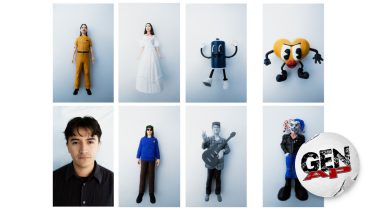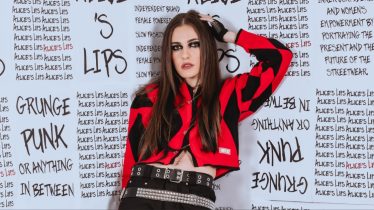
Stand Atlantic on making ‘F.E.A.R’ their most diverse record yet—interview
FOR BONNIE FRASER, 12 MONTHS of COVID-19-enforced downtime away from touring was a huge wake-up call; the moment that she realized how lost she had become in her band, Stand Atlantic, and the lifestyle that comes with it. “I’m, like, addicted to it,” Fraser says today over Zoom from her bedroom in Manchester, England. “I lost complete sight of who I was. I didn’t know what was in store for me — or us — in the future. And I freaked the fuck out.”
“Validation,” she says, isn’t the right word for it. “That’s a bit superficial,” she quips. It was more the rewarding experience of “playing shows and seeing people respond to stuff I’ve written in my underwear.” She felt like music, her dream, was being ripped away. It had nothing to do with money, either. “I was the richest I had ever been during the pandemic” — Fraser pauses, before adding — “letting the government pay me money to sit in my mom’s basement. But it didn’t help anything.”
Read more: The 20 most underrated pop-punk albums from the last two decades
Luckily, that disorienting feeling was (somewhat) temporary. Fraser, and her no-nonsense attitude, are now not only back at her own gigs, but she’s soaking up as many shows as she can in general. Nestled in a black hoodie that just barely covers her brightly bleached hair, the Stand Atlantic bandleader is recovering from her girlfriend’s gig and the after-party that followed in Sheffield. “It’s just not a vibe today,” she moans, leaning over the monitor. Today might be a struggle, but she’s thrilled to be able to see, hear and talk about anything to do with Stand Atlantic.
And Fraser’s passion for music makes sense. She never had a plan B, after all. Growing up with an ’80s rocker father in Australia, the singer-songwriter learned how to play guitar from an early age. “He was the one to teach me the first chords ever learned on guitar,” she recalls. It wasn’t long until she joined her first band — at 10 years of age. “It’s really embarrassing, and no one will ever know the name of that because they will find it,” she says, laughing nervously. To continue making music, Fraser worked “shitty jobs” to help her get by. That was until she met with an old friend, Arthur Ng. In 2012, she and Ng formed a band under the moniker What It’s Worth, Stand Atlantic’s old name.
Read more: Daniel Radcliffe stars as “Weird Al” Yankovic in biopic’s first teaser trailer—watch
Just as they were about to call it quits, the band met Australian songwriter and producer Stevie Knight. Together, they decided to write a song, but it was the first time Fraser had written with anyone else. The self-doubt crept in. “I’m like, ‘Shit. This is going to be so embarrassing. He’s going to realize I’m a phony motherfucker that can’t write music,’” she recalls. Of course, her insecurity subsided when they wrote a voice memo of what would be “Sidewinder.” Not long after, they had what would become the Sidewinder EP, which would land them their first label deal. What followed were two studio albums — 2018’s Skinny Dipping and 2020’s Pink Elephant, the latter of which came out in the early part of the pandemic.
Thanks to an atypical album cycle and infinite time to ruminate, Fraser put her restless energy for being on the road toward what she knew: music. Despite hating Zoom sessions, it’s what helped Fraser get started on what would become their third album, F.E.A.R., released this May. There were only so many songs that could be written through a monitor, however, and Fraser realized she needed to leave the U.K. and head back home to Australia to write in a room with Knight. She was met with a comedy of errors: As soon as she left the U.K. in April, her adopted home opened up all restrictions. When she got to Australia, her native nation almost immediately went back into lockdown.
She and Knight cooked up a plan: She’d spend seven weeks at his house. “I just sat in his bloody lounge room on an airbed with a hole in it for, like, seven weeks,” she says, laughing. “And then the rest of the album was fucking written.”
Read more: The Maine break down every album in their catalog
WITH FRASER GRAPPLING WITH THE EFFECTS of trauma from the past two years, it makes sense that the album title would be rooted in the uncertainty of it all. Usually, the band have a title for the record before they’re even finished, but with F.E.A.R., its title came after — sort of. Fraser had thought of it during the process but had effectively sidelined it. Left with an album without a title, she went back to her random idea. “I was like, ‘That’s fucking perfect. Fuck everything and run,’” she says of the LP name. “All the songs are just me not wanting to be where I was at the time — fucking hating everything — and then the fact that it’s about fear is perfect as well.”
Fraser was terrified of what people were going to think of the record, but mainly, she worried if Stand Atlantic would even be able to perform these songs live again.
It was a valid fear. During the pandemic, some of the Stand Atlantic band members were considering getting a “normal job” because the future of music was looking grim.
“We had a tour schedule that was rescheduled six times,” Fraser says. “It was always like we were just about to get things moving, and then it gets taken away again.” It really puts you in a mindset of, “Is this ever going to be normal again?” But as much as her perspective can be admittedly “negative,” she’s relentless. Fraser refuses to give up: “I never have. I never will.”
Read more: New ‘Jackass’ series coming to Paramount+
That doesn’t mean she didn’t feel the pressure when making the record. “I fucking hate everyone that’s telling me, ‘You can do better.’ I hate it so much because I’m like, ‘Do you even know how much time me and Stevie put into this one song, let alone these fucking 15 that you’re hearing right now?’” she says. It was emotionally taxing. But once the album was done, she began to feel a sense of relief. “Whether they mean to or not, it pushes me harder to knuckle down and keep going, keep writing better music,” she says. “And that’s never a bad thing.”
Fraser can’t deny that it’s what’s helped the band make, perhaps, their fiercest record yet. Stand Atlantic have admittedly always liked to go against the norm. With Pink Elephant, they were edging at being more experimental, without scaring people. But the pandemic made them fearless. “We were just like, ‘What if this is the last record we ever get to write? Let’s do everything we can and everything that we want.’” So the band tried to leave their want for validation and their own self-doubt at the door. In the process, they tried “to make the most diverse record” they’ve ever done. And it gives them and listeners the element of surprise. “When you listen to the record, I don’t think you expect what type of song is going to come next because they’re all so different,” she notes.
I WANT [FANS] TO UNDERSTAND THAT WE’RE NOT EVER GOING TO BE PREDICTABLE. AND I WANT THEM TO TRUST US
—BONNIE FRASER
And don’t expect a grandiose statement about the record as a whole: Fraser can’t give that to you. “It’s an anti-concept record,” Fraser says. “We’ve tried to do concepts in the past, and I just don’t feel like it’s me.” For Fraser, there’s an authenticity to Stand Atlantic’s material that can’t be summed up with an overarching narrative, mainly because it’s so autobiographical. “Music has always been my outlet for my feelings because I don’t talk about them. That’s all I can give you. That’s how I’ve always been [and] how I’ve dealt with it.” Making a metaphor out of an issue has always been easier than confronting it head-on, she says.
When it came to F.E.A.R., Stand Atlantic let any past guidelines disappear. If they wanted to put a breakdown in the middle of a verse or if they wanted to make a guitar tone “the grossest thing you’ve ever heard,” they did it. Of course, some of them didn’t make it onto the record. But tracks such as “molotov [OK]” and “deathwish” were emblematic of that freewheeling spirit. “We were just like, ‘We can literally do whatever the hell we want,’” Fraser exclaims, before adding “as long as it’s a good song at the end of the day.” Their goal? To never be boxed in. “I want [fans] to continue to understand that we’re not ever going to be predictable in terms of style,” Fraser says. “And I want them to trust us to know that even if we change it, we’re going to write the best music we can.”
Read more: Avril Lavigne: “Music takes over your whole life; I had to dedicate my entire life to my music”
With no limits, the group also went after dream collaborations. They recruited “their top pick,” nothing,nowhere., to rap on “deathwish,” a trap-tinged synth-pop track. “I just told him to do whatever the hell he wanted because we trusted him,” she recalls. Snagging Royal & The Serpent for the energetic pop-punk cut “pity party” was unexpected for the band, too. “I didn’t think that would ever happen,” Fraser says in disbelief.
The majority of F.E.A.R., however, featured the intensity of Fraser’s pain throughout the past few years. Opening with “doomsday,” which evokes the thrilling sensation of Avril Lavigne’s “Cannonball,” gives listeners a peek at Fraser’s overall emotional state. In her mom’s basement, surrounded by spiderwebs she couldn’t bother to sweep, she was depressed. “Everyone around me was sad — I was sad — and people wanted me to write music, and I have nothing to write about because I’m not living my life,” she recalls. “That’s how I felt, and that is what ‘doomsday’ literally is.” On “dumb,” Fraser inadvertently ended up creating a song that she feels is “something from 2001,” but describes the double-edged sword of reading comments online.
Filled with anxious guitar riffs, “switchblade” details a period of time when she was being pulled in two different directions. “I felt like I had no control over anything I was doing because I was doing it for other people, which is a constant theme in my life, to be honest,” Fraser says. The track is about her “feeling like a complete rag doll.” With the power-pop anthem “nails from the back,” the Stand Atlantic bandleader leaned into her penchant for metaphors to describe the crippling anxiety she was feeling at a low point where she wasn’t taking care of herself.
Read more: Every blink-182 album ranked
“I don’t bite my nails,” she admits. “But it was a good metaphor for someone feeling anxious, and when I think of things like that, my head goes, ‘What’s the worst way that could happen? What if you bit them from the back forward?’” She clung to that feeling of being trapped — specifically in her mom’s basement at the time — to write the song. “You’re a prisoner in your own head, basically,” she explains.
Fraser took a different perspective on the angsty “molotov [OK].” While she generally tries to avoid being political (“I just don’t feel like that’s my place”), she found herself inspired by a memory she had while she was at a Christian school during a sermon, and they began condemning anyone who was gay “straight to hell.” At the time, Fraser wasn’t open about her sexuality, and it pushed her further into the closet. “I’m in a same-sex relationship,” she says. “That’s my life.” While she hadn’t thought about that memory in years, it made her reflect on how far things have come for not only society but for her. “I just feel for kids who might be going through that,” she says. “It’s not like they’re going out and murdering people. It’s literally the opposite. They’re going out and loving people.”
Read more: ‘Almost Famous’ musical to make its Broadway debut in 2022
Despite being thrilled to be back on the road and putting an album out, Fraser struggles to think about the future. But she, and the band, are in a better place than they were. F.E.A.R., and the vision of a live audience, are keeping her optimistic — for now. “I would love to see [the album] take off in a way that we couldn’t do with Pink Elephant [and] play the songs live,” she says. But she’s trying to push it with the universe. “We realized that people do still care about what we’re doing, which makes us happy,” she adds. “It’s not for nothing.”
This feature appeared in issue 405, available here.









